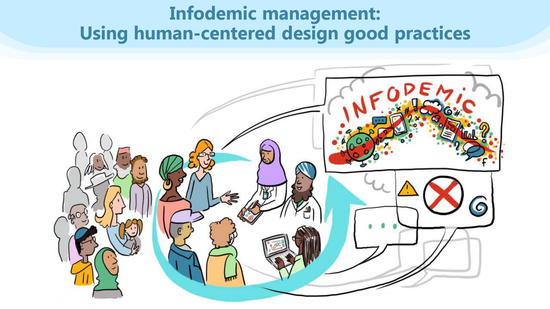
In practice, an infodemic manager working on building infodemic insights reports or an efficient intervention strategy needs a thorough understanding of the information environment and ecosystem of the people and communities affected by the infodemic. This course helps public health workers to understand and use best practices of Human-Centered Design (HCD) to inform their work at different stages of their infodemic management process.
Language: English
English
Health topic
Course information
This course is also available in the following languages:
Overview: The OpenWHO course “Infodemic management: using human-centered design good practices” is intended for anyone interested in building capacities to inform public health authorities’ activities and interventions in infodemic management.
An infodemic is an overabundance of information, accurate or not, in the digital and physical space, accompanying an acute health event such as an outbreak or epidemic. It causes confusion, distrust and risk-taking behaviours that can be harmful to health. Managing a complex phenomenon such as an infodemic requires a thorough understanding of the information environment and ecosystem, as well as of the healthcare system itself. It is therefore essential to include the people and communities affected in the process of designing and developing infodemic management strategies, to enable the generation of adequate infodemic insights and the development of realistic interventions according to the context and available resources.
Duration: Approximately 2 hours.
Certificates: A certificate of achievement will be available to participants who score at least 80% of the total points available in the final assessment. Participants who receive a certificate of achievement can also download an Open Badge for this course. Click here to learn how.
After completing this course, interested participants can enrol in further courses of the infodemic management OpenWHO course series:
What you'll learn
- Explain why human-centered design is a vital component of infodemic management practice
- Identify and explain the process of design thinking
- Demonstrate that an iterative approach is fundamental to good design
- Identify “pain points” to understand the information gaps
- Apply the six basic fundamentals of building interventions with a human-centered approach
- Extend adaptation to different operating environments and ensure that metrics and tools are set up to measure the impact of interventions
Course contents
Introduction: Using human-centered design (HCD) good practices
Module 1: How infodemic management intersects with human-centered design (HCD):
By the end of this module, you will be able to explain why HCD is a vital component of infodemic management practice; express the need to include individuals and communities affected by an infodemic in the design and development of interventions; integrate HCD-thinking into your infodemic management activities.Module 2: Human-centered design principles and process:
By the end of this module, you will be able to list six key principles of human-centered design; employ these principles and learn how to observe and converse during the codesign process; report how the creative mindset is used in HCD process as an integral part of the iterative process; apply tools and methods to each step of the design thinking process.Module 3: HCD good practices in the field:
By the end of this module, you will be able to recognise why identifying infodemic “pain points” is important before you think about interventions and the HCD approach; consolidate from real life examples that demonstrate the integration of HCD; adapt ideas and tools provided here to adopt a lighter, faster approach to HCD within an emergency contextModule 4: Infodemic intervention building: take aways:
BY the end of this module, you will be able to: List basic truths when building interventions utilizing the HCD approach; Apply metrics, measures and tools to evaluate and monitor your interventions, including WHO’s Evidence Gap Map which includes evidence on interventions and lists of outcomes, and related metrics for intervention monitoring; Prepare different tools and approaches to HCD in different contexts where you may have variable access to different types of resources.Final Assessment
Enroll me for this course
Certificate Requirements
- Gain a Record of Achievement by earning at least 80% of the maximum number of points from all graded assignments.
- Gain an Open Badge by completing the course.